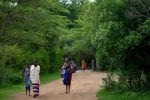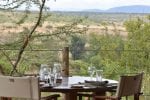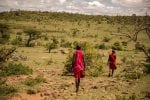Welcome to one of the most authentic forms of safari! Or as Karen Blixen said: “Yes, this was the way it was meant to be”, from the movie Out of Africa. Experience the magical, African bush on foot, where you not only walk in the impressive landscape, but where you can also sense, feel, smell and get up close to nature and the animals that live here. This adventure is perfect for active and adventurous travellers who want to experience something different on the journey. Follow in the same footsteps as the Maasai once did when moving to this part of Africa. And not least, this trip contributes to people and planet.
Contact form

Ecorating: 4.5
This product meets our requirements for Ecorating, a product that is good for humans and the environment.
Does my trip make a difference?
Read more
This product meets our requirements for Ecorating, a product that is good for humans and the environment.
Sample Itinerary

Upon arrival at Masai Mara, you will meet your guide, an experienced community guide. Now you set off in the direction of Wilderness Camp, and along the way you are guaranteed to get acquainted with the first animals along the road in the area which goes by the name Mara Naboisho Conservancy. Naboisho Conservancy was founded with the aim of protecting the local wildlife and ecosystem, while forming the basis for the local Masai people to have the opportunity for income from tourism. Arrival at Wilderness Camp at lunchtime. The camp is an intimate bush camp inside the Saddle Valley where you can enjoy the feeling of being far away from modern disturbances.
After lunch, your guide will take you on a jeep safari, and the goal today is to get close to the large cats, which are most often most active in the afternoon. Experience large herds of grazing animals, and experience how some of the felines prepare for hunting. At noon we return to the camp for dinner and perhaps an exciting chat by the campfire about the day’s experiences with the other guests.

The day starts with a cup of coffee (or tea) when the sun rises. Together with the Maasai we do a morning walking safari. Siesta and lunch in the camp, the afternoon offers another safari and a sundowner out in the bush. Campfire, dinner at Wilderness Camp.

This is going to be a long day as we have to be on our feet almost all day. We start with a hearty breakfast, and then we go with our guide through the amazing landscape. Along the way, the guide tells and shows how nature works, how animals and plants together form a fantastic ecosystem and what challenges you have. Hiking on foot is a unique way to discover and experience this part of Africa, and not least because you often, perhaps a little unexpectedly, discover small details you would not otherwise discover from a jeep. There is a break along the way in the shade, and at some point also lunch in a suitable place – a delicious lunch! At the end of the day we arrive at the bush camp Dorobo, a camp of simpler standard. Bush shower and a sundowner await before there is time for dinner under the stars. Overnight in tent at Dorobo, probably with quite tired legs and feet.

Early jeep safari or hiking is on the schedule in the morning. Eat an adventurous breakfast in the wilderness and get ready for Eagle View Camp – where you stay the last night in an eco-chic safari tent at Eagle View Camp which is really beautifully situated down to a water hole. Jeep safaris in the afternoon with a sunset drink out on the savannah, followed by a quiet and peaceful hike to see what animals we can get close to here in the twilight. Dinner and relaxation by the fire, overnight at Eagle View Camp.

Morning coffee at sunrise, choose between enjoying the wildlife from your terrace or from a jeep. A little later there is time to check out and the trip to your flight to Nairobi or the coast. Safari njema!






Trip details
Ecorating: 4.5
Hotel standard: 4
When can you travel? June – April
Airport: Nairobi Jomo Kenyatta (NBO)
Duration: 4 nights. Can be extended – also by booking several nights at the coast.
Price includes: International round trip flights,full board, double room, safari, nature park tickets, round trip flights Nairobi – Masai Mara.
Price does not include: Beverages, activities not described in the program, visas, gratuities, travel insurance.
Good to know about Kenya & Masai Mara: This is a large nature reserve in southwestern Kenya, and actually a continuation of the famous Serengeti National Park in Tanzania. The area got its name from the people who live in the area (Masai) and what they have for generations called the area: “Mara”, which in Masai language means “spotted”. A good description of a landscape where trees, shrubs, savannah and shadows from clouds form a “spotted” image.
Good to remember: In the Masai Mara, water is in short supply, so drink and use it with care and respect. The Masai are a proud people, always ask before you photograph. Bring notes in smaller denominations to be able to buy local crafts and the like in the small communities. How to greet the people you meet? In the same way that we in the Western world do – you take hands.
Mobile coverage and internet: The hotel has internet and mobile coverage is good. However, it is a wish of the management that you prefer to turn off the mobile, or use it discreetly.
Time zone: GMT + 3
Vaccinations: Read more about which vaccinations to use, for example hereStatens Serum Institut
Packing: On safaris in the Masai Mara you are often 1,300 – 1,500 meters above sea level, and both in the morning, in the evening and at night it can be quite cold. Bring a good sweater and windbreaker, good shoes for walking in
Bring a small backpack to be able to bring water, binoculars, camera or other personal belongings on the excursions. We recommend soft rather than hard travel bags – they are easier to transport along the way, so a backpack or similar is a good choice. Mosquito nets are available on site, but feel free to bring mosquito spray or similar.
Local currency: Kenyan Shilling
Observer: Kenya has banned plastic bags and this is checked by customs. If you bring a plastic bag, this can mean a fine.
Weather right now: Weather Masai Mara
Water:
Security: The Masai Mara is an extremely safe area. In the capital Nairobi, however, do not go alone in some places – this is especially true in the city center.
More information can be found hereRejsevejledninger på um.dk
Travel entry requirements: : All travelers to Kenya must apply for and be approved for an Electronic Travel Authorization (eTA) to visit the country. Click on the link below and follow their instructions (Applicants should have their passport and travel information and payment card ready). The price is 35 USD per person including children. If you are a family traveling, you can apply together. Apply no later than 3 weeks before departure. Se mer här: Electronic Travel Authorisation (eTA)

Ecorating: 4.5
This product meets our requirements for Ecorating, a product that is good for humans and the environment.
Does my trip make a difference?
Read more
This product meets our requirements for Ecorating, a product that is good for humans and the environment.
Wilderness and Eagle View Camp, Mara Naboisho, Kenya:
Your trip means that Basecamp Explorer Camps can further invest in the best and most environmentally friendly and high-tech solutions. All electricity for heating, water technology, water heating and lighting comes from solar panels. Closed septic tanks are used for the toilets. All waste is sorted and materials are recycled and recycled from here as long as is practically possible. All organic waste is composted and used to improve the soil at the camp – including in Obama’s tree plantation. Water for the plantation comes from wastewater from baths, dishes and laundry. This water can easily be used for the purpose, as you only use environmentally friendly soap, dishwashing liquid and washing powder on site.
Many of the adventures you will experience happen on foot along with guides from the Masai people. You will gain a deeper understanding of the conditions of life in this part of Africa, the culture and how to look at nature here.
Your trip contributes to the local economy, as 85% of the employees at Basecamp Explorer come from the local nearby area. The camp invests in social programs to improve the area’s water supply, health, education, culture and then not least has started a shop where local women produce and sell traditional Masai jewelry.
Project:
Empowering Maasai women;
In 2002, the Basecamp Masai Brand project – a handicraft project that produces and sells Maasai jewelry – was started by 150 local Maasai women whose lives are positively affected by gaining access to income and development.
Re-wilding the Masai Mara;
They provide protection and preserve natural areas through the largest indigenous tree nursery in Mara where over 200 000 trees have been planted around the main camp. Already in 1998, a tree planting project was started in the area around the main camp, which resulted in an improved natural environment with richer bird and animal life. These measures restore biodiversity and increase resilience to the negative effects of climate change. In conjunction with this reforestation project of the Masai Mara, the camp works with Maasai and landowners from the surrounding area to implement a major waste management program through the collection and recycling of waste.
Biodiversity Conservation, Mara Naboisho;
Mara Naboisho Conservancy – a land conservation project includes a 26,000 hectare wilderness area. The reserve is run by the Naboisho Maasai community and consists of 500 landowners. The Mara Naboisho Reserve is sustainable, transparent and a fair model that ensures that tourism really pays for itself by creating long-term benefits for all. Here you contribute directly as a guest to the local Masai landowners through the park fees you pay.
As a guest, you contribute to the above project through your stay here.






